So last we knew, it was… maybe September. Then “Gem Harvest” leaps forward to late November. The next episode leaps to late December. And the episode after that, “Steven’s Dream,” brings us to early spring, the following year. ZOOM ZOOM GOTTA CATCH UP
This whole season is just non-stop dread, basically. Every episode so far has served to foreshadow Big, Not-Good Shit that’s going to happen before too long. And now we reach one of its big stress points.
God, I don’t know what I’m going to parse out of Rocknaldo when I get there.

I know there’s a big time-skip between this and the previous episode — at least three or four months — but every time an episode starts in Greg’s van, or with Steven waking somewhere other than the Temple, I feel like I’ve walked into something halfway through.
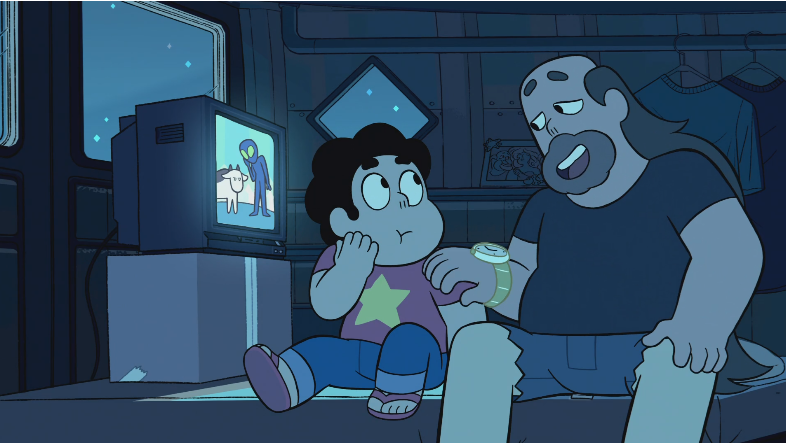
I wonder how Greg’s filing system works, considering the clutter in his van is completely different in property and volume depending on the dramatic or comedic needs of the individual scene. And he doesn’t seem to use his storage unit anymore.
The way things start here, the issues that immediately come up, you know we’re revving up to go into Season Plot overdrive at this point. There’s no way to tell quite where the story’s pointed, but something ominous is looming. And Steven’s discomfort has never been more palpable
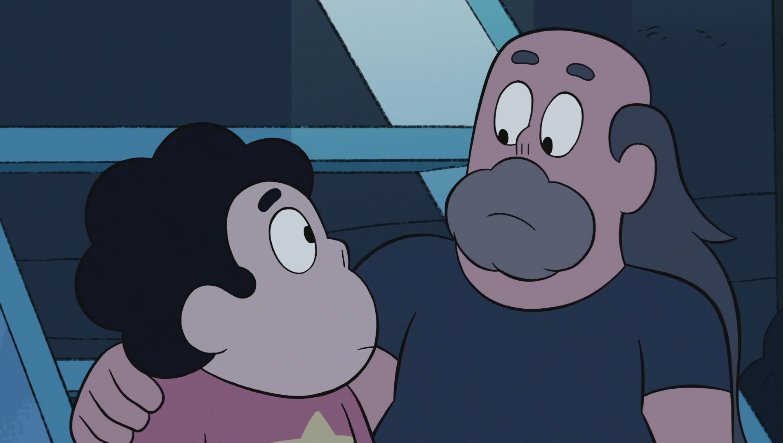
After waking up crying (though there’s another explanation for that, as we’ll see, it certainly isn’t a great way to begin), he tries to make sense of all the things that have been haunting him, but he doesn’t quite have the words, or know the right questions. Greg tries to help.
If you’re only gonna use Connie for two minutes, you better wave her dork flag hard.
There follows only the second shouting match Steven has ever had with the Gems. Significantly, at this point Amethyst’s first impulse is to back him up.
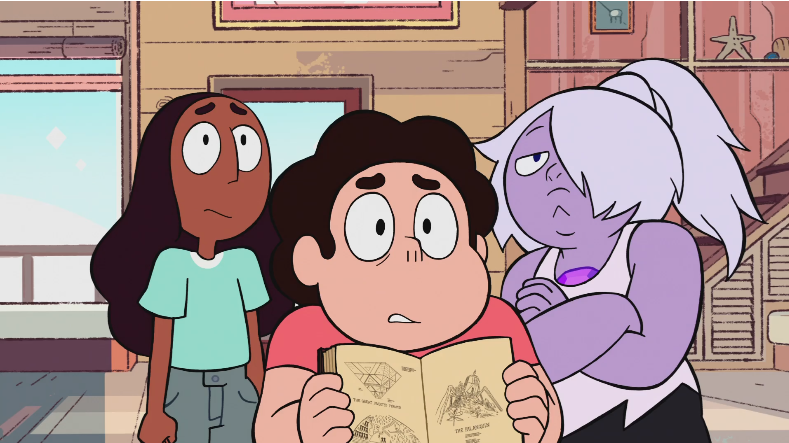
For the first time, really, all of that frustration over everyone’s failure to see or hear or tend to Steven’s own building, roiling problems boils over, and he lashes out, turning to his human family for support.
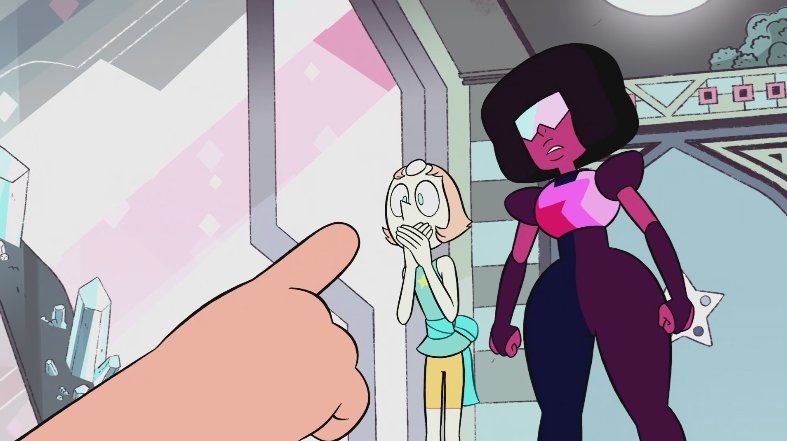
Greg, being Greg, doesn’t get anything but implicitly goes with it
The thing that’s so important here, is that he’s been holding back all of these feelings for so long — then when he finally lets them explode out, the consequences are catastrophic. And by involving Greg in his problems, he nearly loses him. The lesson here being… not healthy.
This whole sequence of events, it not only compounds his trauma and outsized sense of guilt; it confirms for him that all of his problems, they’re for him alone to carry. Nobody can help him. Nobody should help him. It’s irresponsible to let anyone even try, from here on.
This is also where Garnet’s social awkwardness really becomes a liability, for maybe the first but not for the last time. She has no idea how to talk to Steven, and she’s so caught up in the battle between her anxiety and her need to seem in control, it all falls apart.
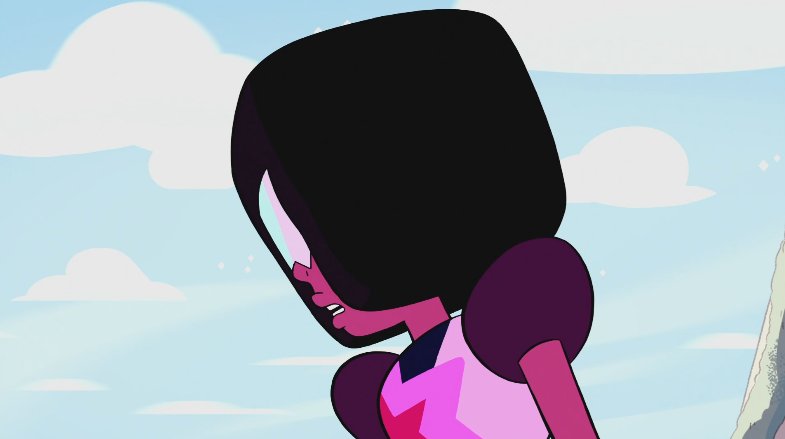
She throws out one command, then rehearsed mom-ism, after another, hoping to shape events the way she sees they need to go, but she has no idea how to actually connect with Steven in the present. It’s all some formula that she can’t figure out.
And that relationship that they’d been building to that point, it kind of evaporates. They get a new relationship later. And it will be better, probably. But that’s for when it comes.
When it becomes clear she doesn’t have any tools left, she just drops it all, and we see her as earnest as Garnet probably ever is. All she has left is to plead.
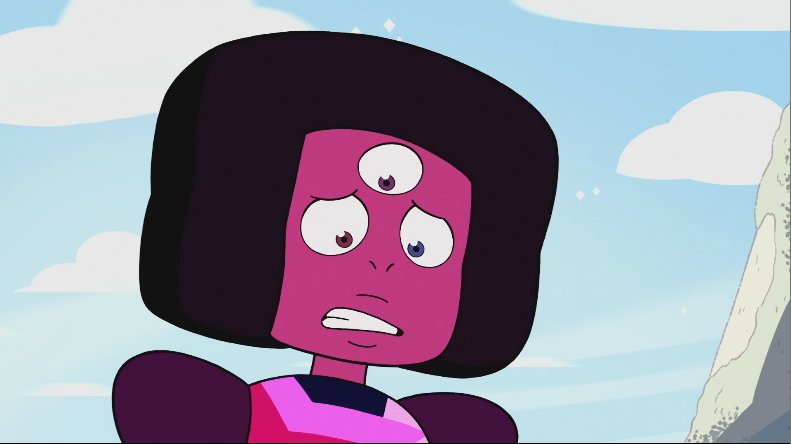
But, it comes too late. These character dynamics, I don’t see people discussing them. It sets up everything to come.
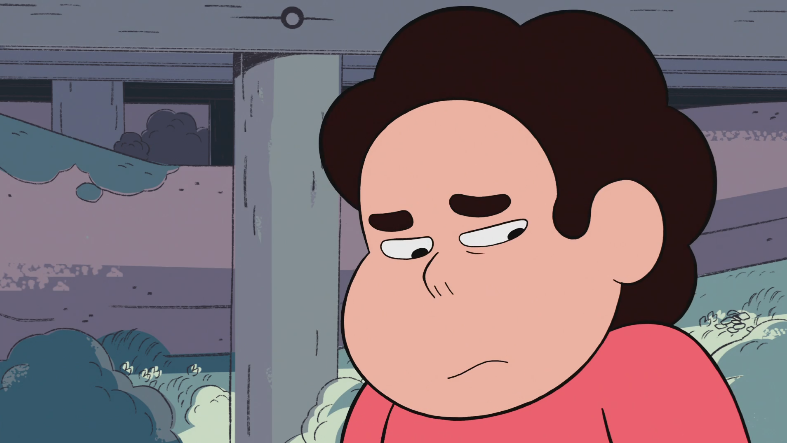
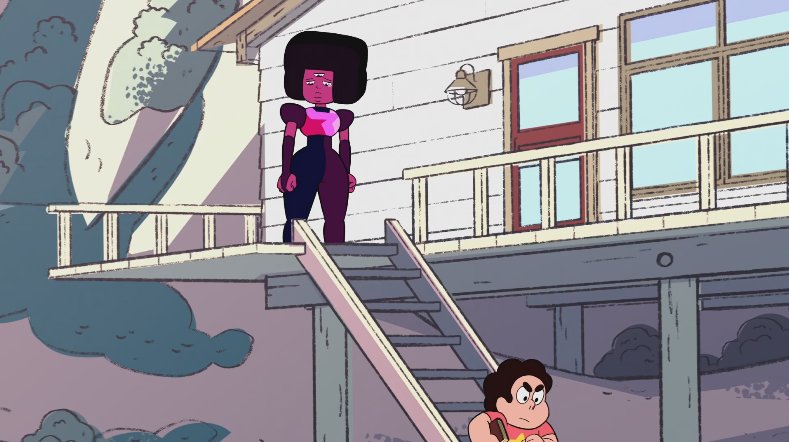
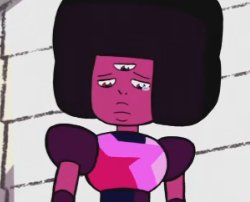
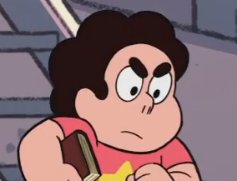
That’s her Sapphire side, the rational side, crying. The one who sees what’s coming and tries to organize everything, keep everything under control. The one who failed here.
Steven is so taken aback that anyone could give a shit what he’s going through. Of course Greg would care, even if he had no clue what was going on, but it’s all coming out now. And just that moment of feeling validated, it puts him off guard. Makes him feel safer than he should.
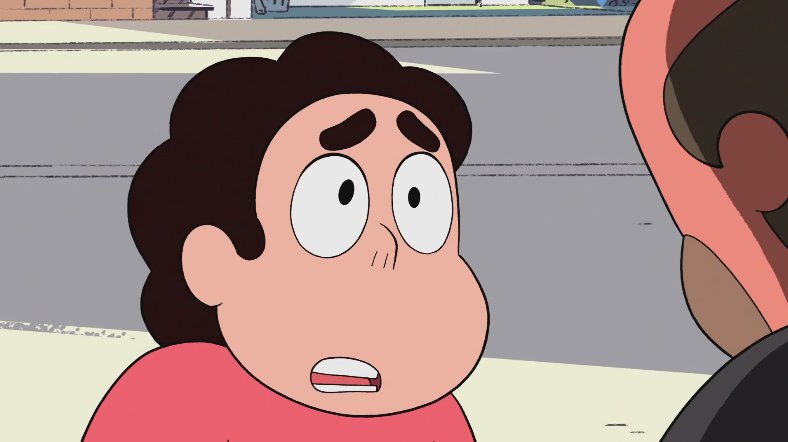
Steven himself doesn’t even know. He doesn’t have words for it. So many of the facts are so cryptic in and of themselves. He doesn’t know how to untangle his emotions from the mystery they relate to. This is all just a desperate grasp at understanding, via this one tangible clue.
It’s not that the palanquin or the dream are themselves important. It’s the fact that he feels like no one gives a damn. They’re the current, practical symbol of everything he’s been going through that he feels incapable of dealing with and yet completely alone in trying.
Obviously after Greg defuses the tension, we’re in for a comedy montage. HA HA Korea! What happens in Korea? It’s the eye in the storm, and it’s such a new level of wacky that you know it’s dialing hard to compensate for the tone that’s to follow.
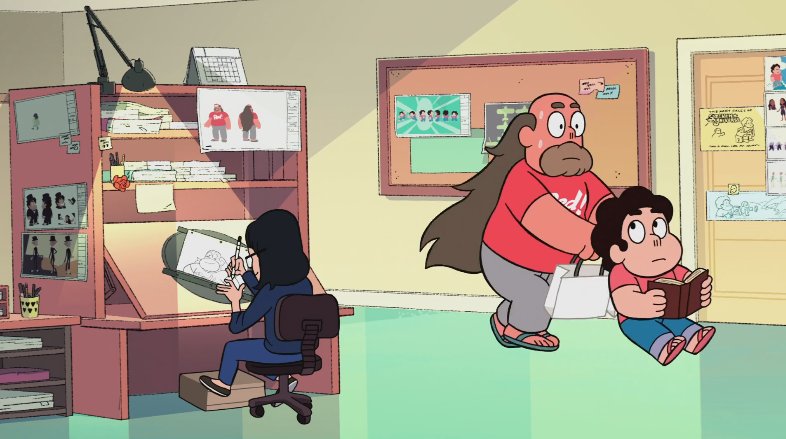
If you notice, the animator even has a model sheet of herself.
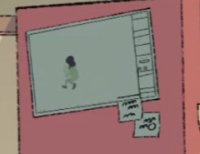
“This feels familiar.”
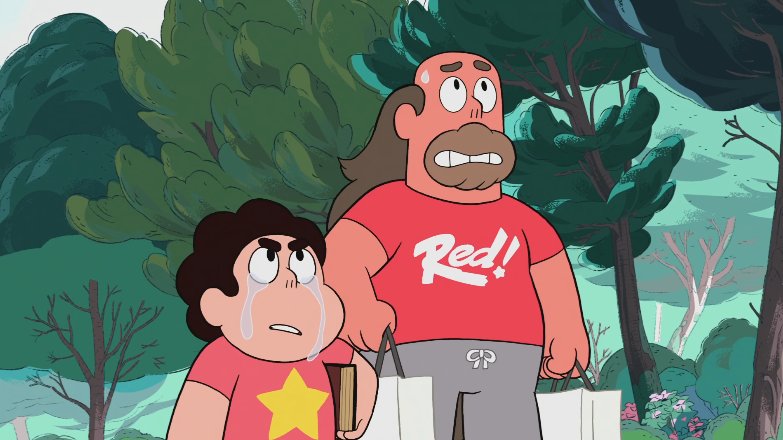
Pearl has been here, and recently. Geologically speaking. Exact same handwriting, in fact.
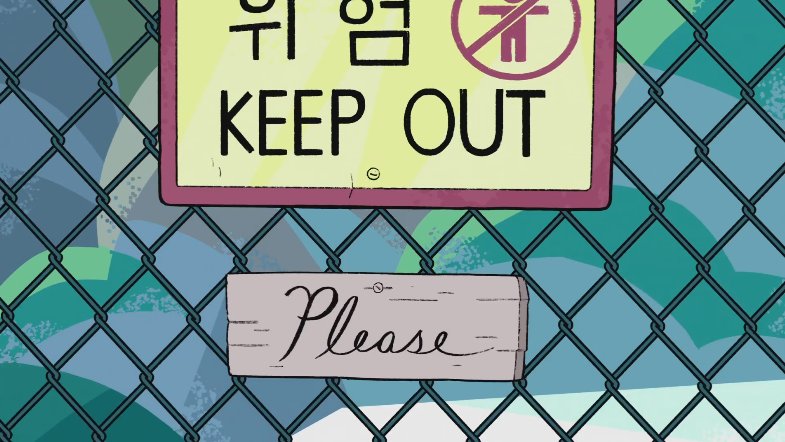
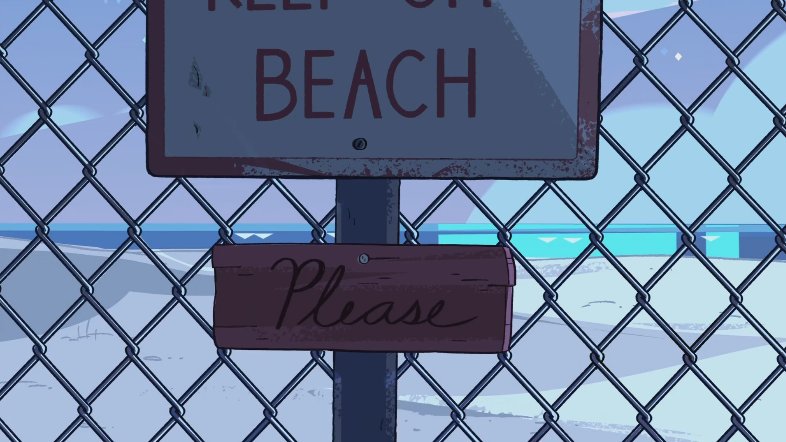
Just in terms of dramatic mirroring, note that the threat Steven uncovers here is the Diamond who most demonstrates her grief and guilt over… well, a certain someone. Whose deeds and absence are the whole reason Steven has been suffering, and presumably tuned in to Blue’s tears
Steven is lured in by this shared experience, and it’s only Greg’s substitution of his shared experience with Blue that the dramatic link with Steven is severed enough to escape the pull. If it weren’t for Greg, Steven would probably be the one carted away at this point.
Of course, that leaves Steven to interpret things exactly the other way around.
Classically, the Diamonds never look directly at anyone. One only sees them in profile, or from behind, even if they deign to speak. Just as Greg caught Steven off guard with the notion that anyone could care, Blue is astonished at meeting anyone with the capacity for empathy.
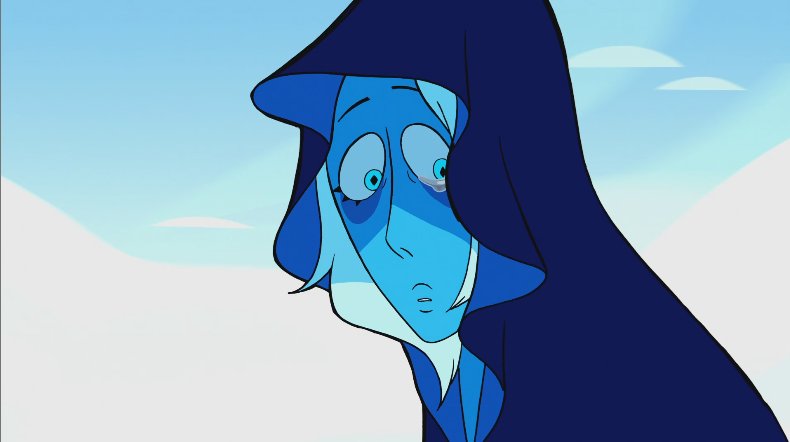
Sorry, just. The way they draw lips on this show never fails to puzzle me.
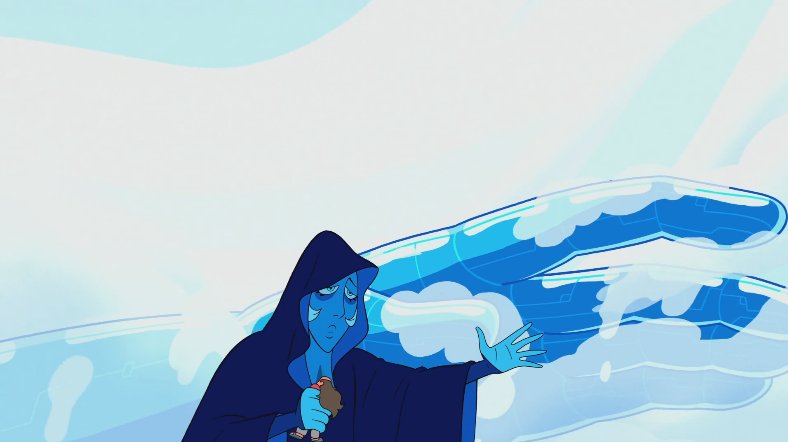
I just noticed how this failed, desperate grasp almost exactly mirrors Steven’s hopeless dive after the falling Gems in “Change Your Mind.”
S04E12: Adventures in Light Distortion
“Adventures in Light Distortion” is… Okay, sidebar here. Often I find when people complain a story doesn’t make sense, or doesn’t do what it plainly does, it’s just that they’ve talked over the parts that explain what’s happening, because Big Plot Stuff isn’t screaming at them
I’m sure you’ve been in a room, trying to show someone a thing, and at the key brilliant moment you’ve been waiting for, suddenly they turn and have a random loud conversation about yarn with someone in another room or whatever. This also happens in a distributed critical sense.
“Adventures in Light Distortion” is kind of a buffer episode, to pace out the Big Plot Stuff. In terms of strict story details, it just documents a voyage from Place A to Place B, and so therefore could be elided, and therefore people shrug it off as filler and tune out somewhat.
But it’s also the episode where all of the emotional impact of the previous episode has a chance to register and where Steven basically… gets broken. To an extent, everything else that happens for the rest of the show is a result of what he goes through in these eleven minutes.
This isn’t a show about plot. It’s a show about emotional consequences. The show barely even cares about plot. It rushes through Things Happening at such a pace that the action barely registers, so it get get to people feeling things about what occurred. Which is what matters.
But, people are bad at understanding stories. Just, as a rule. So the parts of the story that actually matter, they’ll talk over or fall asleep or fast-forward and dismiss as filler, so that they can crunch on the narrative pretzels on the boundaries of the actual point of it all.
Anyway, “Adventures in Light Distortion” is basically… yeah, not much happens, except in the sense that almost every beat is what we’re looking for. This is where Steven’s guilt and his trauma all crystallize. And he’s never quite the same after this.
(Which is a statement one could, and I do, keep making almost every episode. Doesn’t make the significance any less here, though.)
I could go over it beat by beat, but I’d just be quoting the entire episode. The most key point is how the episode drives home the Bad Lesson from the previous one: that Steven can never let anyone in. No one can help him, and if he lets them try, he’ll only get them hurt.
The whole point of the zoo arc, the final trigger to Steven’s downward spiral, is in the climax to this episode.
None of this is new. He’s been haunted for a long time. Ever since the start of season two, Steven’s been… not quite right. But he’s been able to put aside Ronaldo’s terrible advice, more or less, and try to be Steven. Until the point it was too much to cope with.
Had “Mindful Education” come a season or two earlier, maybe things would have been different. By the time it hit, Garnet’s otherwise solid guidance wasn’t nearly good enough. Too much had happened. The trauma was too deep. It was out of his hands.
So we kind of go back to this. Except, now, all the time.
Which makes the fallout to the season 4 finale, and all the… stuff that comes up over that estrangement arc, it’s basically like someone flipped back and explored an alternate path where Steven chose not to let Connie in at the end of “Full Disclosure.” But, amplified grandly.
I’ve also seen people dismiss “Full Disclosure” as a dull padding episode. Which just… I don’t… Okay, look, I need to calm myself down. But yow, the precise qualities that lead to a fan mindset seem to be the qualities that make a person terrible at understanding a thing.
I guess the deal is, watching a TV show or a film takes a certain kind of literacy, just like reading a book. But it can be less obvious when a medium just flows at you on its own accord, rather than requiring that you pick it up and run the source code in your head.
I kind of feel like… Okay. You know how I sometimes talk about my hyper protectiveness of art and its messaging, and how from my experience the way that people respond to art is much the way that they respond to other people? To me, in particular?
The deal with this, it’s like autism. Let’s say you’ve got autism. It’s mild enough that you can kind of pass for neurotypical, if odd, most of the time, with effort. So, you’d think you can just live in the same world as other people, right, so long as you stay mindful.
The problem is, you’re not speaking the same language as them. You’ll meet the odd other person on the spectrum, and your brain will explode at the notion that you seem to speak the same language. Because otherwise, you don’t. At all. You use the same words, but they don’t align.
People will say things, and you’ll think you’ll understand, then they’ll grow hostile because… apparently they meant something other than the words they spoke. You’ll say something innocuous, and they’ll grow hostile, accusing you of saying things you never intended or would’ve
If you’re high enough functioning, over time and trial and error you’ll be able to triangulate some things and draw up some mental flowcharts and paranoia yarn boards to allow you to traverse the constant riddles posed by the neurotypicals you meet, only tripping on occasion.
You’ll develop these absurd problem-solving muscles that, with great energy, will with maybe a three-out-of-four accuracy will help you to understand at least what you don’t understand in the things that people say to you, and clue you in on what may be missing.
But you’ll be the only person you’ll ever meet who’s doing this. Nobody will ever return the favor to you. They’ll read you at face value in their own language, and take away what they want, and make it your problem. Every single time. Every single person you’ll meet. Forever.
They’ll assume they know exactly what you’re saying, exactly what you mean, because they know what a neurotypical person would probably mean if they said the things that you said in the way you were saying them. And they’re not used to making accommodations for alternative views.
This is also the way almost everyone approaches art.
The issue with a populist medium like TV or film or videogames, that does spells out much of its representation, is that it inadvertently tricks people much as you might do as a person with high functioning autism into thinking it’s having a simple conversation on their terms.
So people can skip the idea of literacy, and just be… bad at watching TV, bad at watching films, bad at listening to recorded music. And so on. Even if they find a thing they like and obsess over it, watch it over and over, that doesn’t guarantee they’ll actually listen to it.
I don’t think I’m coming at this from the position of a snob. It’s more like the position of… a snub? It’s that I empathize with the plight of art. And I feel furious on art’s behalf at a belligerent lack of engagement, especially when it has something worthwhile to say.
Which just redoubles this thread’s fractalline recursion:
A thing I’ve heard a few times is that it’s the only season without a plot. And, uh, what? The entire season is about Steven’s mental breakdown. It’s about his trying and failing to cope with all the things that have happened, the things he’s learned, and what they mean for him.
Gad’s menagerie, I’m just feeling sad now.
I will say, though: just caught Peridot’s comment about “Era 1 light kites,” suggesting that in Rose’s time Homeworld used to conquer worlds with the power of solar sails. Colonial technology indeed. Helps to be functionally immortal when you’re travelling as slow as light.
There are also things to say about the Rubies popping up as objects of turbulence, during this journey. Considering what happened before, how hard that affected him on at least a couple of fronts (the Rose/Pink end; the Eyeball end). Considering how they’ll come up later.
They’re there both for thematic/representative and long-term plot/objective value, yet the moment is played off for comedy. Because this is how Steven Universe works. And this is why it’s easy to miss even glaring pieces of straight-out allegory, at times.
One obvious thing: the way it turned out, the first volume of Steven Universe has three clearly delineated acts. Season one, the first 52 episodes, is nearly all exposition. World-building. Plot Event One, that sets up the second, development, act, is “The Return”/”Jailbreak.”
Seasons two and three (originally produced as one entity) are kind of the Two Towers of this story. Lots of wheel-spinning, slowly putting pieces in place, exploring themes, making a journey out of the journey, so the third act can happen. Seasons four and five are act three.
Though really it feels like season four takes up a transitional role, because although it’s technically the first half of the third act, it also acts as sort of the third half of the second act. Which… would explain structurally, I guess, why season five is so long.
The split, that maybe in part explains why season four confuses people, is plot development, versus character and theme. In empirical story terms, Plot Event Two is Steven learning about the shattering of Pink Diamond. This sets up what the show is about for the rest of its run.
Thematically and in character terms, though, Plot Event Two is Steven throwing himself away, in response to all of the fallout from Plot Event One. Which is why the through-line from “Full Disclosure” to “I Am My Mom” is so direct.
“You don’t need this / You don’t need me”
So season four is simultaneously in the shallow end of exploring new story territory while it ramps up to a huge emotional climax, with the latter taking up most of its concentration and the plot details operating almost in the background. Like we’re back at season 1A again.
It’s curious that each of the three acts had different production circumstances. The first half of season one was meant as a full season in its own right — but then the network extended it by 26 episodes, so there’s this bump and swerve in the middle of the season.
Season two was then commissioned as a full 52-episode season, so they took the time to plan out the story over that length, letting it sprawl more organically. However, after 26 episodes went out, the network arbitrarily said, OKAY, THAT WAS SEASON TWO. Which made it all weird.
Seasons four and five were at first commissioned as a full 52-episode season, but then I guess after the season two split (into two and three), they hacked up the production into halves, with S4 as production S3 and S4 as production S4.
Somewhere along the way, I dunno under what circumstances, I guess someone finagled an extra six episodes. That seems to have happened before they began active work on season five, because they seem to have planned out the season for 32 episodes from the start.
Anyway, this does add to the sense of the middle being muddled, and the third act having a similar dramatic bumpiness to the first one.
Scanning back to Plot Event One there, to muse on The Song. “Stronger Than You” is so much larger than life, almost larger than the surrounding show, that it’s hard to talk about in sensible terms. But the thing that gets me is the part I don’t see discussed nearly as often.
Yeah, the sequence is boarded and animated and edited better than almost anything on the show. Yeah, the song is a catchy stand-out, the first to be sung by Estelle, as part of a major revelation for the show that recontextualizes everything to that point. It’s exciting, heroic.
But it’s the lyrics that get me. Rebecca Sugar’s lyrics tend to be nearly Reznor levels of on-the-nose. Except even his work under a layer of tortured sub-collegiate poetry. Sugar’s words just… say what they’re saying. They carry some levels, but they’re direct. Open. Earnest.
It’s the context and delivery that make them. I talked about this before with “Escapism”; how Sugar’s uke demo was genial enough, but the song never did much for me until fully arranged, performed by AJ Michalka, and positioned in the narrative.
And what makes “Stronger Than You” work for me, more than anything, is what’s being said. In particular, after the bridge with the dialogue up on, er, the bridge (God, is that narrative pun intentional? Likely.) and Jasper plowing Garnet into the ground.
That moment Garnet resumes singing, the battle seems dangerously like it could go either way. We’ve already seen her poofed. This was the finale. It wouldn’t be outside of a reasonable story structure for this to be her last stand. It would make total sense as that.
The animation and framing and editing here, they all contribute to that sense of tension and fragility. Then we have the lyrics, and particularly Estelle’s delivery of them. The self-declaration. The defiance. The mantra-like statement of what she holds dear. She sounds ready to go.
It seems clear, by all context, that Garnet is prepared for this to be the last thing she ever does. And if it is, she’s going to make it about everything. The clarity. The earnestness. The directness of the lyrics. This is their strength. They contain a sense of finality.
Garnet kneels there in the dust: battered, torn, her visor cracked; leered over by Jasper. And just calmly now, as if to herself: “This is who we are / This is who I am / And if you think you can stop me / Then you need to think again…” And every time, I can’t help mist over.
She pulls herself to her feet; steadies herself. “Because I am a feeling / And I will never end… “
She re-manifests her gauntlets; readies a stern but weakened stance. “And I won’t let you hurt my planet / And I won’t let you hurt my friends.”
Cue round two. This is it.
Every line accompanies an action, or directorial beat. It feels out what’s happening That last couplet is close to the final new thing Garnet has left in her to say. The act of saying it is the thing that gives her the strength to push one last time. From here she’s mostly repeating. She does come up with another short verse, the moment she gets in her first good strike in the battle and seems to begin plotting out her ending move. Which seems significant, in terms of melo-narrative.
Especially as her ending move basically involves backing down, conserving her energy, letting Jasper make a big move of her own and planning to jiu-jitsu it. “I am their fury / I am their patience / I am a conversation” Her own strength is illustrated in action as she sings it.
It’s likely a ploy. We just saw her reference future-vision seconds before the fight. As she pulls herself up, she seems to be struggling to rehash the start of the first round, letting Jasper get over-confident, then basically narrates how she’s outwitting her as she does it.
She may have led Jasper to the core, knowing she’d stand no chance in direct one-on-one. Which would give purpose to her taunting in the first round. Ali vs Foreman and all. But as it plays, that’s made to be unclear. It’s made to feel that this could be the end of her story. And structurally, all kind of a vamp, chasing after that declaration.
People thought Ali was getting killed in the ring during that fight, like they were literally witnessing a murder, when what he was doing was letting Foreman tire himself out and waiting for an opening. I don’t follow things like boxing, but it’s one of those cultural things.
Another curious thing about this sequence is how it’s one of the only times the show fudges the rule that everything has to come through Steven’s perspective. We do once, briefly, see him peer at a monitor in the bridge, but he can’t have seen the whole fight.
Still, the premise is that he’s watching the fight on TV, same as we are. Which makes me wonder if Ali is what they had in mind here. His deal was never that he was the strongest; it’s that he was wily, playing people’s weaknesses. And he’s often seen as an aspirational figure.
Mind you, Garnet did just endow Steven with future-vision before he ran off. So he may have watched the fight infinite times from infinite angles, and we’re just seeing the stitched-together version.
I’m just wondering if removing him and ostensibly setting him up as a common viewer with the audience was intentional for other reasons besides the logistics of staging and so forth. Establishing that dramatic distance, so we really don’t know how it’s going to play out.
If he were right there, we’d know things would turn out okay. But with this setup, it introduces the plausible idea that we’re witnessing a tragedy as it happens. Which again makes me wonder if that Ali fight was an inspiration on some level. The show references so many things.
So. People read the whole sequence as triumphant, which it is, but the thing that hits me is the vulnerability. The desperation. The fact that the outcome is not clearly preordained; the song serves at once as an ideological declaration, personal meditation, and potential epitaph.
“This is who we are / This is who I am” reads to me like a final statement. If it comes to this, then that’s what happens. She is who she is. This is how she will be remembered. But then, the statement that begins the next round also has a troubling sense of famous last words.
So it’s those two lines, in fairly rapid order—written so directly, sung with such steely vulnerability, visualized so carefully—that really make the song for me. That nail the emotional stakes of the thing. She’s ready to die here, basically. Making her peace. But not giving up.
And I think that’s what makes the whole sequence. Which in turn makes the whole episode. It’s really about that couple of lyrics.